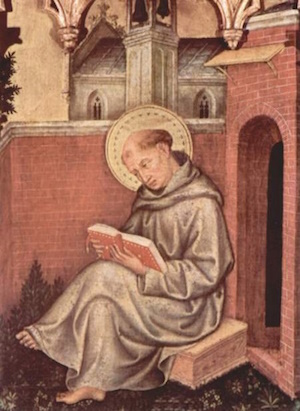
Teacher of the Faith
Detail from Valle Romita Polyptych
by Gentile da Fabriano (c. 1400)
Outstanding thinker and teacher of his time, Thomas Aquinas had, moderately wealthy, ambitious parents. Sent to the abbey of Monte Cassino in the hope he might one day become abbot, he developed a profound religious faith.
While studying in Naples, he became interested in the new ministry of the friars with their commitment to poverty and hard work. His family didn't approve, and imprisoned him at home in Roccasecca for a year, before giving up in the face of his determination.
1244 Thomas joined the Dominican Order and spent the rest of his life immersed in universities in France and Italy, writing, preaching and debating. His writings are marked by the peaceful tone in which he conducted debates, no zealous attacking arguments, only a passionate commitment to underlying principles and a focus on the argument, never on the person. He earned he nickname “the angelic doctor”, not just for the depth of his thought, but for his promotion of peace.
His life and enormous output of writing, mark a turning-point in the medieval church. The new friars brought the gospel to the cities and took over the universities. Thomas was at the centre of the new theology. Traditional theology was dominated by Plato's teaching of distrust of the senses with truth in ideas and spiritual reality to the point where revelation and knowledge of God were unrelated to general human knowledge. The rediscovery of Aristotle, for whom the senses are the basis of all human knowledge, led to a new way of understanding the world. Most theologians reacted against the new ideas. A few like Thomas welcomed them boldly, endorsing the scientific exploration of the world. Thomas believed human reason had limits, that there are matters of faith that are not dependent on the senses, but that there is only one truth that encompasses both, so it can be maintained that faith is not irrational, and that the world is an expression of divine truth.
Thomas’ ideas radical for his time, were regarded by many as heresy. His own profound religious faith and the link he saw between faith and reason gave him a deep interest in the Eucharist, where the spiritual and physical meet. His hymns for communion are still sung.
BORN: 1225, Roccasecca, Italy.
DIED: 7 March 1274, Abbazia di Fossanova, Fossanova, Italy
 Welcome
Welcome Calendar
Calendar Today's Word
Today's Word Lauds
Lauds Terce
Terce Sext
Sext None
None Vespers
Vespers Compline
Compline Matins
Matins